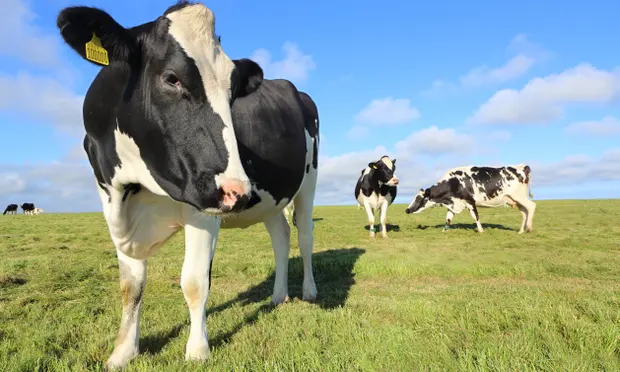
The government must tackle lack of workers or risk a crisis in milk production, say industry leaders.
The UK’s largest dairy cooperative has said there could be further increases in the price of milk and other dairy products if the government does not urgently tackle labour shortages in farming.
The lack of workers is fuelling food price inflation, Arla said, warning that without action this could also lead to a crisis in milk production.
Staff shortages are just the latest challenge facing dairy farmers, the cooperative said, following the outbreak of war in Ukraine, which has pushed up the cost of producing milk to record levels. Figures from the Office for National Statistics (ONS) showed the price of dairy products rising steeply in May, with low-fat milk climbing by 28.5% in a year, butter by 14.1% and the price of cheese and curd increasing by 33.4%.
Staff shortages in farming and the wider food industry are compounding farmers’ problems, according to a survey carried out by the cooperative, which represents a third of Britain’s dairy farmers.
Its director of agriculture, Paul Savage, said: “We are at serious risk of continued food price inflation and longer-term food security issues if we don’t tackle this now.”
Almost three-fifths of Arla members polled said they were finding it harder to find staff than in 2019, blaming the end of free movement of EU workers resulting from Brexit, as well as the pandemic, for their recruitment problems.
The survey found that 12% of farmers were considering quitting dairy production altogether because of the challenge of finding workers. Others said labour shortages might cause them to reduce their milk output or cut the size of their herd.
Problems finding labour have already prompted farmers to raise pay for farm workers, leading to higher wage bills. The 600 farmers surveyed by Arla in March said that on average they had increased pay for their workers by 22% since 2019.
The majority (60%) of dairy producers said they expected wage pressure to continue for the next year, which would continue to have an impact on food prices.
The cooperative is calling on the government to work with the industry to help bring more young people into food and agriculture.
Young people have a limited understanding of what modern farming involves, Arla found, and more than half of the farmers surveyed (55%) said none or very few of the applicants for current jobs had the right skills.
The cooperative is also calling on ministers to create clearer routes into a career in farming through apprenticeships and the T-level vocational qualification.
Dairy farmers had to challenge preconceptions about the industry, Savage said. “One of the biggest challenges we face is recruiting people into the industry.”
He said farmers “work with innovative new technologies and data, and they’re at the forefront of tackling climate change. We know that all of these are important factors when people are choosing their careers.”
Harry Davies, an Arla farmer, said he had seen the pressure that staff shortages put on the cost of milk production.
“A career in dairy farming is extremely rewarding with our role in feeding the nation and playing our part in reducing emissions and caring for the land around us,” Davies said. “But we can’t educate people about this on our own.”

























